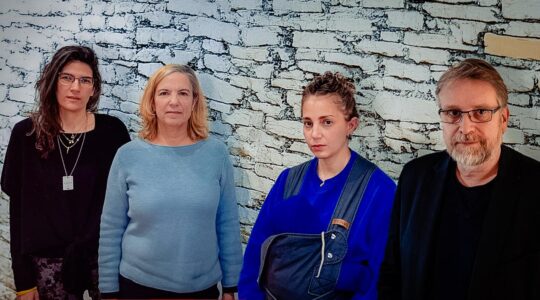(JTA) — Ira Forman, the Obama administration’s special envoy on anti-Semitism, disputed claims by Russian President Vladimir Putin that Ukrainian revolutionaries were spreading hatred of Jews.
In an interview published Thursday in the Jewish Daily Forward, Forman said Putin’s assertions were not credible.
“We have no indication that what President Putin has been saying about anti-Semitism has been a true reflection of what’s happening on the ground,” he said.
On March 3, Putin said at a news conference outside Moscow, “What is our biggest concern? We see the rampage of reactionary forces, nationalist and anti-Semitic forces going on in certain parts of Ukraine, including Kiev.”
Putin was referring to the ouster of Ukrainian President Viktor Yanukovych, who fled Kiev in late February following months of violent protests that began as demonstrations over his perceived pro-Russian foreign policy. Activists from the ultranationalist and xenophobic Svoboda party and the Right Sector movement had a prominent role in the revolution.
Two Jewish men were assaulted by street gangs and a synagogue was torched during the unrest, but Ukrainian Jewish leaders said the political affiliation of the perpetrators was unclear and that the instability did not result in any proliferation of anti-Semitic acts.
In the past, Svoboda members and its leader, Oleh Tyahnyabok, have made anti-Semitic statements. The party also maintained that the correct Ukrainian word for Jew was “Zhyd,” a term deemed derogatory by Ukrainian Jewish leaders. Tyahnyabok urged Ukrainians during a 2004 speech to fight the “Muscovite-Jewish mafia.”
Svoboda also has glorified Stephan Bandera, a Ukrainian resistance fighter who during World War II partnered briefly with Nazi Germany against Russia before turning against the Germans. His troops were responsible for the murder of thousands of Jews, according to the Simon Wiesenthal Center.
On Thursday, Russia accused the West of condoning anti-Semitism after French Foreign Minister Laurent Fabius offered a defense of Svoboda.
“There are three [problematic] members of the Svoboda party, which is more right wing than the rest but the extreme right is not in the center of government,” Fabius said Tuesday in an interview for Inter Radio.
The Russian Foreign Ministry responded with a statement released on Thursday warning of ”a dangerous erosion of the policy of rejecting nationalism, xenophobia and anti-Semitism as displayed by Svoboda.
“We fail to understand the ease with which some of our Western partners change their attitudes in favor of fleeting geopolitical dividends,” the statement said.
JTA has documented Jewish history in real-time for over a century. Keep our journalism strong by joining us in supporting independent, award-winning reporting.





